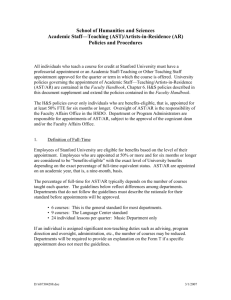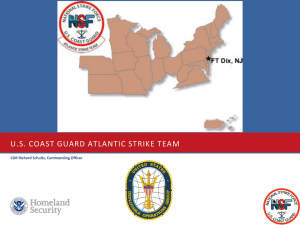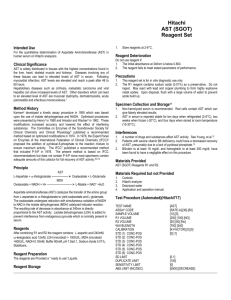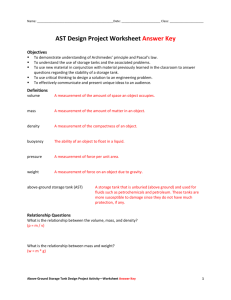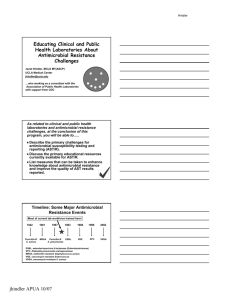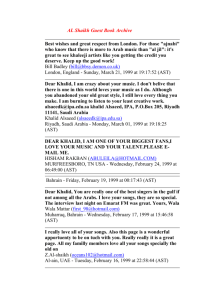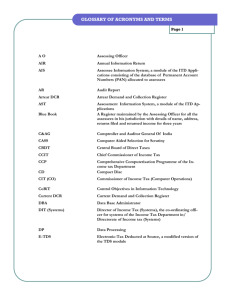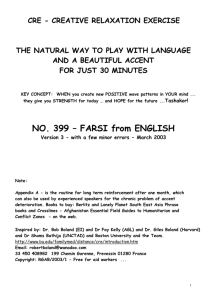AST Design Worksheet – Group 5
advertisement
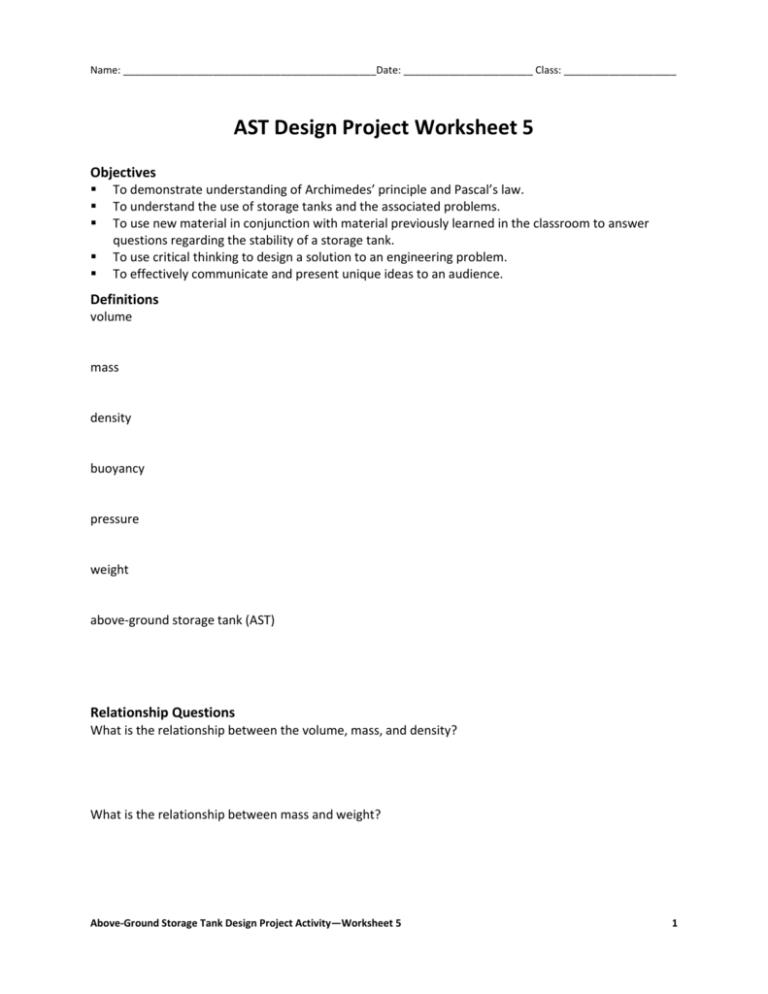
Name: _____________________________________________Date: _______________________ Class: ____________________ AST Design Project Worksheet 5 Objectives To demonstrate understanding of Archimedes’ principle and Pascal’s law. To understand the use of storage tanks and the associated problems. To use new material in conjunction with material previously learned in the classroom to answer questions regarding the stability of a storage tank. To use critical thinking to design a solution to an engineering problem. To effectively communicate and present unique ideas to an audience. Definitions volume mass density buoyancy pressure weight above-ground storage tank (AST) Relationship Questions What is the relationship between the volume, mass, and density? What is the relationship between mass and weight? Above-Ground Storage Tank Design Project Activity—Worksheet 5 1 Name: _____________________________________________Date: _______________________ Class: ____________________ Questions 1. How many hurricanes occurred during the year that you were born? _______ List all hurricanes with name, date and brief description including category, effects, landfall location and other interesting features. 2. What U.S. group is responsible for tracking and predicting weather systems in the tropics? 3. What types of failure do ASTs experience? What specifically causes these failures? 4. How does Archimedes’ principle apply to ASTs? 5. How does Pascal’s law apply to ASTs? Above-Ground Storage Tank Design Project Activity—Worksheet 5 2 Name: _____________________________________________Date: _______________________ Class: ____________________ Design Project 1. Derive an equation for the weight of the AST. Hint: Units should be (lb) which is lbm. If you get units of (ft*lb/s2), you found weight in lbf. 2. Derive an equation for the weight of the liquid inside the AST. Hint: Units should be (lb), which is lbm. If you get units of (ft*lb/s2), you found weight in lbf). 3. Derive an equation for the weight of the water displaced (Hint: units should be (lb) which is lbm, if you get units of (ft*lb/s2) you found weight in lbf) 4. Use the equations you derived in questions 1, 2, and 3 to derive an expression to determine whether or not the AST will displace or remain stationary in the case of a flood. Above-Ground Storage Tank Design Project Activity—Worksheet 5 3 Name: _____________________________________________Date: _______________________ Class: ____________________ Your Design Criteria Group 5 Diameter, d (ft) Height, h (ft) Steel type Density of steel, ρs (lb/in3) Shell thickness, t (in) Petrochemical type Density of petrochemical, ρL (kg/m3) Height of petrochemical, L (ft) Density of water, ρw (kg/m3) Surge height, S (ft) 90 30 ASTM A516, Grade 55 0.284 0.5 (maximum allowable thickness = 1.5) Toluene 866.9 5 1000 8 5. For what purposes is this type of steel commonly used? (Cite your sources!) 6. What is your petrochemical? What is primarily used for? What are other common names for your petrochemical? (Cite your sources!) 7. According to the equation you derived in question 4, will your AST displace? Show your work. Above-Ground Storage Tank Design Project Activity—Worksheet 5 4 Name: _____________________________________________Date: _______________________ Class: ____________________ a. If your AST displaces (if your AST does not displace, skip this question and go to part b): i. What variables cause the AST to displace? ii. How high should the petrochemical level be so that the AST does NOT displace? If your petrochemical level is already the height of the AST, what other variables can you change so that the AST does NOT displace? b. If your AST does NOT displace: i. How high would the surge level need to be so that the AST does displace? ii. What other variables can you change so that the AST does displace? Above-Ground Storage Tank Design Project Activity—Worksheet 5 5 Name: _____________________________________________Date: _______________________ Class: ____________________ c. Create a graph in Excel that illustrates the weight of the water displaced vs. surge level (S) for 0 < S < h. Make sure to include: 1) a data marker that indicates the point at which your AST displaces, 2) the weight of the AST + weight of liquid inside AST as a constant value somewhere on your graph, 3) axis titles, 4) axis labels, 5) a clear title and 6) a legend. 8. As a group, come up with at least one idea to prevent displacement OR buckling. Create a schematic diagram or build a miniature prototype to present to the class. (One idea for either displacement or buckling is the minimum. If you would like to come up with an idea for displacement and buckling, or more than one idea, feel free to do so.) 9. Prepare a 5- to 8-minute presentation (using PowerPoint or equivalent software) that includes: The dimensions of your group’s AST The storm conditions assigned to your group Whether your group’s AST displaces or not The graph of weight of the water displaced vs. surge level (S) for 0 < S < h Whether your group’s AST will buckle given the storm conditions Your design proposal for a solution to these problems (If you build a miniature prototype, you do not need to add this to your PowerPoint, just show the model prototype.) Above-Ground Storage Tank Design Project Activity—Worksheet 5 6
